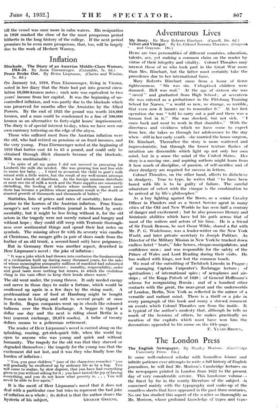Inflation
Blockade. The Diary of an Austrian Middle-Class Woman,
7s. 6d.)
ON January 1st, 1919, Frau Eisenmenger, living in Vienna, noted in her diary that the State had put into general circu- lation 10,000-kronen notes ; each note was equivalent to tiro years' income from her capital. It was the beginning of un- controlled inflation, and was partly due to the blockade which was preserved for months after the Armistice by the Allied Powers. By the end of 1923 the pound was worth 316,000 kronen, and a man could be condemned to a fine of 500,000 kronen as an alternative to forty-eight hours' imprisonment. The diary is of special interest to-day, when we have seen our own currency tottering on the edge of the abyss.
Those who suffered most front the Austrian inflation were the old, who had retired on pensions or on fixed incomes, and the very young. Frau Eisenmenger noted at the beginning of 1919 that butter cost £4 to £5 a pound, and could only be obtained through illicit channels because of the blockade. Milk was unobtainable :
" In spite of all my pains I did not succeed in procuring for Liesbeth the milk she needed. She was growing less and less able to nurse her baby.. . I tried to accustom the child to goat's milk mixed with a little water, but the result of my well-meant attempt was a bad attack of diarrhoea. As the foreign missions distribute at most one tin of milk a week and the State supplies are constantly dwindling, the feeding of infants whose mothers cannot nurse them has become a problem whose gruesome result is the death or
stunted growth of thousands and thousands of babies." •
Statistics, lists of prices and rates of mortality, have done justice to the horrors of the Austrian inflation. Frau Eisen- menger's not very well-written journal is blurred by senti- mentality, but it might be less living without it, for the old actors in the tragedy were not merely ruined and hungry and without hope ; they could still weep with Teutonic thorough- ness over sentimental things and spend their last notes on symbols. The missing silver fir with its seventy wax candles at Christmas, the meagre gifts (a pair of shoes made from the leather of an old trunk, a second-hand suit) have poignancy.
But in Germany there was another aspect, described in Herr Liepmann's novel : the joke of inflation :
" It was a joke which had thrown into confusion the fundamentals of a civilization built up during, many thousand years, for the sake of whose meaningless pomposity millions of mankind had submitted to a throttling, humdrum existence ; morality, respectability, order and good taste were nothing but straws, to which the credulous clung in the vain effort to keep their heads above water."
The old went under, the young throve. It only needed energy and nerve in those days to make a fortune, which would be swallowed up again in a few days by the rising mark. A problematical case of food at Hamburg might be bought from a man in Leipzig and sold to several people at once in Berlin. Bogus companies went up in clouds like coloured balloons over the Stock Exchange. A beggar is tipped a dollar one day and the next is riding about Berlin in a taxi (current exchange, 29,874 marks). A bribe of twenty dollars means to a policeman retirement.
The reader of Herr Liepmann's novel is carried along on the splashing, roaring, get-rich-quick tide, when the world lay open to anyone who was young and quick and without humanity. The tragedy for the old was that they starved or degraded themselves ; the tragedy for the young was that the excitement did not last, and it was they who finally bore the burden of inflation :
" You, you poor children " (one of the characters remarks) " you will gradually be swallowed up by ordinary life as by a bog. You will come to realize, by slow degrees, that you have had everything given to you without asking for it ; you have tasted the joy of having everything, and you do not know what poverty is. . . . You will never be able to live again."
It is the merit of Herr Liepmann's novel that it does not deal with a particular ease but tries to represent the bad joke of inflation as a whole ; its defect is that the author shares the




































 Previous page
Previous page